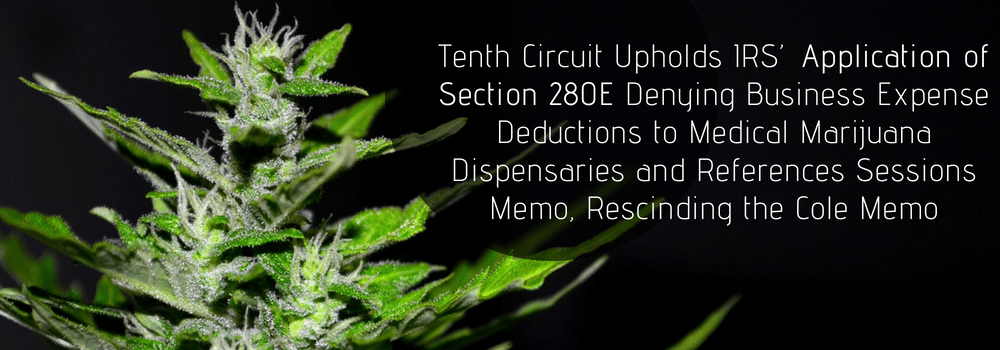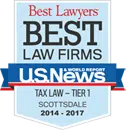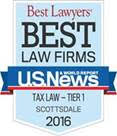Nevada Marijuana Businesses and Federal Income Tax Challenges Regarding Business Expense Deductions In 2001, the…
Tenth Circuit Upholds IRS’ Application of Section 280E Denying Business Expense Deductions to Medical Marijuana Dispensaries and References Sessions Memo, Rescinding the Cole Memo
Over half of the country’s fifty states and the District of Columbia have legalized medical or recreational marijuana use. But the federal government still classifies marijuana as a “controlled substance” under the Schedule I of the Controlled Substances Act. Under this Act, it is unlawful to knowingly or intentionally “manufacture, distribute, or dispense . . . a controlled substance.” The IRS has consistently denied business deductions to marijuana dispensaries under Internal Revenue Code section 280E, which prohibits any deduction or credit for any business that consists of trafficking in controlled substances. See Olive v. Commissioner, 792 F.3d 1146 (9th Cir. 2015); Canna Care, Inc. v. Commissioner, T.C. Memo 2015-206; Californians Helping to Alleviate Medical Problems, Inc., v. Commissioner, 128 T.C. 173 (2007); Alterman & Gibson v. Commissioner, T.C. Memo. 2018-83.

Alpenglow is a medical marijuana business operating legally under the laws of Colorado. The IRS audited Alpenglow’s 2010, 2011, and 2012 tax returns and used section 280E to deny its business deductions. Alpenglow is a pass-through entity and as such, its individual owners received IRS notices of deficiency, increasing their tax liabilities for the three years under audit. The two owners paid the increased tax assessments and filed an IRS claim for refund. The men then sued the IRS in federal district court when the IRS denied their refund claims. The United States successfully filed a FRCP 12(b)(6) Motion to Dismiss. Alpenglow appealed to the 10th Circuit.
Alpenglow made several arguments attacking the IRS’ application of section 280E. First, it argued that the IRS lacks authority to apply section 280E until after a federal prosecutor has investigated and charged a taxpayer with violating federal criminal law and a judge or jury in a criminal proceeding has issued a guilty verdict. The Tenth Circuit first noted that it had rejected this argument in The Green Solutions Retail, Inc. v. United States, 119 AFTR 2d 2017-1658. There, Green Solution had sued to enjoin the IRS from investigating its business records in conjunction with an audit focused on whether business expenses should be denied under section 280E. The Court concluded that Internal Revenue Code section 7421 (the Anti-Injunction Act) prevented it from exercising jurisdiction over Green Solution’s suit for the purpose of restraining the assessment or collection of any tax.
In addition, the Tenth Circuit said that there is no evidence Congress intended to limit the IRS’ investigatory power. Indeed, the Internal Revenue Code contains other instances in which the applicability of deductions turns on whether illegal conduct has occurred (i.e., section 162(c)(2), which denies deductions for illegal bribes and kickbacks). Furthermore, other courts have upheld tax deficiencies against state-sanctioned marijuana dispensaries under section 280E, without questioning the IRS’ authority. See Olive v. Commissioner, 792 F.3d 1146 (9th Circuit).
Next, Alpenglow argued that section 280E violates the Sixteenth Amendment (granting Congress the power to lay and collect taxes on incomes, from whatever source derived) because it prevents the deduction of expenses that a business could not avoid incurring. The Tenth Circuit responded by citing a Supreme Court case: “Congress has unquestioned power to condition, limit, or deny deductions from gross income in arriving at the net which is to be taxed.” Helvering v. Independent Life Ins. Co., 292 U.S. 371 (1934). The Court said that deduction of business expenses falling within the general definition of section 162 may be disallowed by specific legislation, since deductions are a matter of legislative grace and Congress can disallow them as it chooses. And in passing section 280E, Congress did just that by denying ordinary and necessary business expenses incurred by businesses engaged in drug trafficking. Where the Supreme Court has proposed that Congress make the choice whether to deny deductions, the Tenth Circuit said it found it difficult to conclude that Congress acted unconstitutionally in doing so. 
Alpenglow also argued that section 280E violates the Eighth Amendment to the Constitution. The Eighth Amendment provides: “Excessive bail shall not be required, nor excessive fines imposed, nor cruel and unusual punishment inflicted.” Citing again to its decision in Green Solution, the Tenth Circuit stated that section 280E is not a penalty because the disallowance of a tax deduction is not imposed as a punishment. Rather, tax deductions are a matter of legislative grace and they are not a matter of right.
Finally, Alpenglow argued that the “Dead Letter Rule” prohibits the IRS from denying deductions under a law when there is a public policy of non-enforcement of the law. See Sterling Distributors, Inc. v. Patterson, 236 F. Supp. 479 (N.D. Ala. 1964). The Tenth Circuit rejected this argument, saying that Alpenglow failed to demonstrate widespread acceptance or adoption of the “Dead Letter Rule.” In addition, the Court stated that the Department of Justice has specifically rescinded its former policy of non-prosecution (the Cole Memo) for marijuana dispensaries complying with state law. See Memorandum from Jefferson B. Sessions, Att’y Gen., U.S. Dept. of Justice for all U.S. Att’ys (Jan. 4, 2018).
If you own a business operating under state-sanctioned marijuana legalization laws, you need to work with an experienced tax lawyer to understand your tax rights and responsibilities. The landscape is changing so quickly that you need a legal advocate on your side to help you navigate it all. If your business is audited and you don’t have detailed information about every single transaction, you risk forfeiting your Cost of Goods Sold claim and you could be subject to penalties for filing an inaccurate tax return.
Silver Law PLC operates in Arizona and Nevada and all of its lawyers are former prosecutors for the IRS. A tax law attorney from our team can help you understand how the complex tax code applies to your NV marijuana business operations. We’ll help you ensure that you are meeting your obligations. If you have been audited or are facing tax collections, we can also help you navigate that process. We can either find ways to bring down your tax debt or can negotiate a settlement for you. Call us today to talk with a tax lawyer and learn more.

Email: lchapman@silverlawplc.com
Website: taxcontroversy.com
Arizona Location
7033 E. Greenway Pkwy, Ste 200
Scottsdale, AZ 85254
Office:(480) 429-3360
Henderson Location
410 South Rampart Blvd, Suite 390
Las Vegas, Nevada 89145
Office: (702) 801-1000
Las Vegas Location
410 South Rampart Blvd, Suite
390 Las Vegas, Nevada 89145
Office: (702) 726-6819
San Diego Location
7676 Hazard Center Drive, Suite
1525 San Diego, CA 92108
Office: (619) 387-3790
Coronado Location
724 1st St.
Coronado, CA 92118
Office: (619) 612-5337
Utah Location
11576 S. State Street, Suite 1002
Draper, Utah 84020
Office: (801) 340-7514
















Leave a Reply
You must be logged in to post a comment.